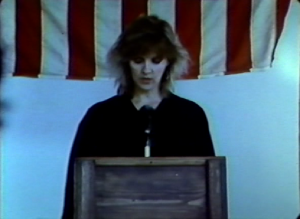From the Chicago Reader (March 1, 1989). — J.R.
James Benning’s 1988 feature, a substantial letdown after his Landscape Suicide, charts the filmmaker’s involvement with Lawrencia Bembenek, a former Milwaukee policewoman who, despite her persistent claims of innocenc, was convicted of killing her husband’s first wife in the early 80s. (Her case led to articles in Cosmopolitan and People, in part because of her achievements in prison reform while serving a life term.) Although several commentators have compared this film to The Thin Blue Line, there are many crucial differences: Benning’s friendship with his subject, a more extensive use of actors, and Benning’s background as an experimental filmmaker who generally uses narrative only in a skeletal and simplified form. (Bembenek’s own voice — like Benning’s — is used throughout, but an actress plays her on-screen.) Perhaps the principal problem lies in Benning’s failure to set down all the relevant facts of the case in an easily digestible form; he chooses, rather, to introduce them out of chronological sequence. In addition, his own semi-maudlin confessional letters, which are read offscreen (along with Bembenek’s terser ones), keep clouding the various issues raised. As in Benning’s earlier and better films, long takes that focus on midwestern landscapes are often employed, but without the sense of mystery and provocation that they usually have. What emerges is mainly muddle — interesting as a footnote to Benning’s fascinating 11 x 14, One Way Boogie Woogie, and Landscape Suicide, but pretty embarrassing in most other respects. (JR)


